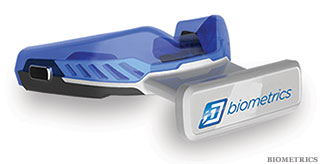Despite the medical advancements and spike in concussion awareness during the past few years, the ability to quickly and accurately detect head impact in athletes is severely lacking.
Often, especially at the youth, high school and amateur levels, diagnosis is left up to team physicians or trainers. And while these individuals are extremely valuable and necessary, they are subject to human error.
So a considerable need remains for someone or something that can instantaneously measure head trauma in athletes. Enter i1 Biometrics.

The Connecticut-based information and technology company recently released a new mouthguard which detects both the linear and rotational acceleration of a player's head upon impact. The mouthguard measures where and how hard an athlete got hit and will instantly transfer that information to a computer or smartphone on the sidelines. There, a trainer can analyze the data, and based on how the player is responding as well as his or her head trauma history, that person can decide whether that player should be allowed to stay in the competition.
"You have pitch count to measure the number of pitches thrown by a pitcher to a protect a kid's elbow, but there's nothing that is measuring what we're measuring," i1 Biometrics CEO Lawrence Calcano told ThePostGame. "What's happening to an athlete's brain, arguably the most important organ we have."
Calcano said certain high school and college teams will be testing the mouthguard this spring while i1 Biometrics works with medical and research experts to improve the technology. The company hopes to have the mouthguard ready for wide scale distribution by the time football season rolls around in the fall.
If all goes well, athletes in several contact sports (football, hockey and lacrosse) could use the mouthguard, which costs $150. And ideally -- this is a little ways down the road -- information from a player's mouthguard would be submitted to a cloud database so coaches, parents and trainers would have access to it at all times.

As a former college hockey player himself, and father of a teenage daughter who suffered a serious concussion while playing soccer, Calcano knows the value of sports and the impact they have on millions of children. The task for him and his i1 Biometrics colleagues is to find a way to make these games safer.
"As we think about the prevalence of contact sports in our society, whether it’s football, hockey, lacrosse or soccer, these are games that we love to play," Calcano said. "We as a society love sports and love the lessons that our kids get from sports -- teamwork, comraderie, hard work, etcetera. And we think it would be tragic if we didn’t have these sports to play."




